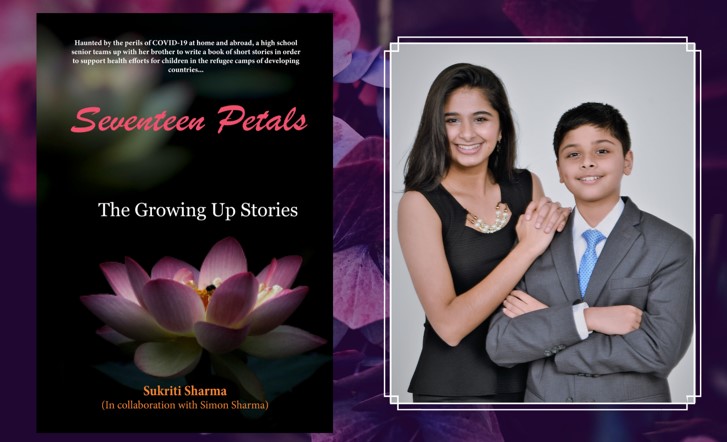Nepalis Abroad
I feel proud and anxious at the same time when I look back on my journey as a writer. Proud because Fairfax County Public Library, America’s second-largest public library system, has not only kept my book on its shelves but has invited me and my co-author, Simon Sharma (also my brother) to give a talk to the young adults on our growing up as writers.
I'm also anxious because the upcoming 15th of September observes the second year anniversary of the publication of my debut “Seventeen Petals: The Growing Up Stories” and I have not written anything except for a few articles for my university newsletter.
If I say that transitioning to a university is time-consuming and overwhelming, it would be a completely lame excuse. However, it really was overwhelming for me as I had left my parents, my little brother, and the homemade Nepali food for the first time in my life.
But here is the good news: I am planning on a second book on people from very diverse ethnic backgrounds but the same sponsor for their academic goals. This new venture will be challenging because it is going to be part biography and part American history of giving which needs to be 100 percent researched and fact-based. But I have already made up my mind and am working on it.
Sorry for meandering a little. Let’s get to where we had left off.
What initially started as personal writings on an untitled google doc eventually turned into a large-scale quarantine project. The idea of publishing didn’t even cross my mind until much later after sharing the stories with my parents. When they encouraged me to keep writing more and expressed how much it resonated with them, the thought of publishing a book didn’t seem as far-fetched.
The more I thought about it, I came to the realization that I could use this as an opportunity to help those in times of need by donating all the money raised to Khudunabari Refugee Camp. It was then that I was able to immerse myself in the creative process of writing and finishing the stories.
Anyone who is familiar with the writing process can agree when I say you experience a good amount of writer’s block when going through multiple. Ideas get pushed around, frustration starts to rise, and the beginning stages of quitting start to present themselves. But that’s the beauty of it and now I genuinely mean it when I say it was worth it in the end because I’m able to hold the finished product in my own hands.

I am happy to reiterate that in light of the COVID-19 pandemic, Simon and I had made the decision to write the book and donate 100% of the proceeds to support children in refugee camps in Nepal. Within the first three months of its release, the book was able to raise $2,741.48 and every penny has since been donated. The book was purposefully centered around a common theme of the number 17: my age, the number of stories, the number of petals present in a lotus flower, and the number of popular human personality traits we grow up with.
One of the first lessons my parents instilled in me was maintaining the discipline of telling the truth, and even more importantly, learning how to forgive others. That is why the first chapter of the book discusses forgiveness and developing the ability to realize your mistakes. The second chapter features a story on truth and the power a guilty conscience has on a person.
The stories, though, are more about the lessons they teach rather than my own life. Although certain instances in my life have influenced the stories, I did not want to make herself the main character in her book. Hence, every story is written in the third person with the exception of two. Additionally, there is one story, in particular, titled ‘On Waking Up’ that I modeled after Simon, my younger brother, who offered his unique perspective.
I did not want my personal thoughts and emotions to get in the way of the reader’s interpretation of the story and wanted them to come to their own conclusions as they see fit. I did not want my possible bias to hinder them from understanding the true meaning behind each story.
It’s a ‘feel good’ book of short stories. And the stories are not the reflections of my imagination but of the memories that were created while growing up. I wrote and published this book because I had always longed for a book like this to be on my bedside: small, short, anecdotal, and feel good type when you take frequent turns in bed and sleep would still be a far cry.
The book starts with human beings’ utter ignorance about not caring for others but themselves. It mocks our basic nature of laughing at others; our culture of spitting venom against others not knowing that spitting up in the air does not go anywhere but comes back to your own face. Then Simon and I chose from a list of stories that talked about the common human personality traits.
The other stories revolve around themes like acceptance, humility, purpose, diligence, service, truth, innocence, anger, perseverance, waiting, belief, wisdom and etc. The last story is about our mistaken perception of death; the way we demonize it and become frightened by the very shadow of the thing that is inevitable.
If you ask me ‘what is the most satisfying thing in my own book?’ I for sure, without hesitation, would say that the most gratifying thing about my book is the foreword by Professor Iswari Pandey. It nails everything down.
I am beyond thrilled that I am invited to a talk by a public library. I feel it is more rewarding than receiving a prize because I have the opportunity to pass on my advice to my readers.
What should I say next? Simon and I are just lucky children of my parents who chose to build their home in Fairfax County. I do not think they chose to live here thinking that the Fairfax County Public Library (Virginia, USA) would one day recognize their children to deliver a talk. But here we are, and the rest is history!
(Sukriti Sharma is a co-author of “Seventeen Petals: The Growing Up Stories”. The book is available on Amazon. Sharma and her co-author brother Simon Sharma spoke at a book talk this past weekend.)
 (1)1670571795.jpeg)





